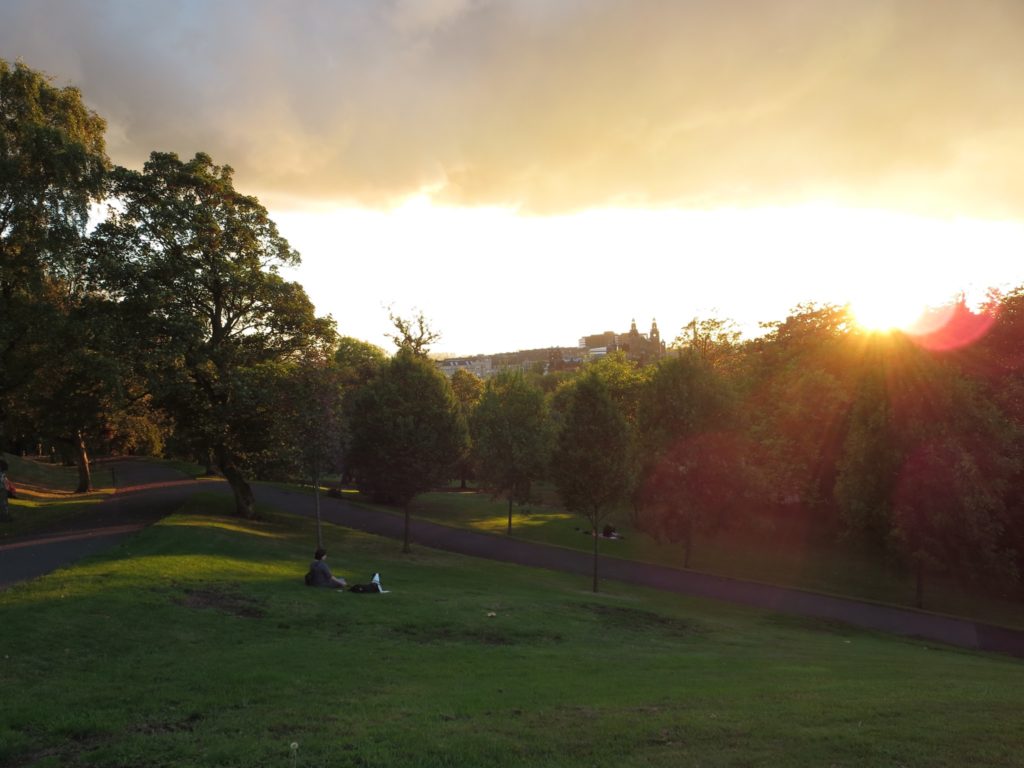
IIn 2014, a year was spent living in Glasgow, Scotland. At that time, enrollment was in the Master’s program in Interior Design at the Glasgow School of Art. When selecting a study destination, the criteria included choosing a university with a strong focus on architecture and located at a high latitude. The emphasis on a high-latitude location stemmed from the desire to experience firsthand how the significant difference in the sun’s height between summer and winter influences daily life and culture. This offered a unique opportunity to learn through personal experience.
A longing for the fleeting, ever-changing beauty of the sky
While walking through the parks of the city, what left the strongest impression was the sight of people gazing at the setting sun, almost as if they were reluctant to let it go. Glasgow, located at a latitude of 55°, experiences a prolonged twilight in summer, with daylight lasting until around 11 PM. However, as winter approaches, the time of sunset gradually becomes earlier and earlier.
In Scotland, there is a term to describe the sky after the sun has set: Gloaming. This word translates to “twilight” or “dusk” and originates from terms like twilight or dusk.
Scottish English is distinctive, with a strong accent that is often difficult for native speakers to understand (and I too found myself repeatedly asking for clarification, always feeling a bit apologetic…). Nevertheless, the people of Scotland take great pride in their Scottish identity and place immense value on their culture and way of thinking. The word Gloaming itself originates from the Old English term Glomung, which originally meant “to glow” or “to shine”. Over time, it fell out of use in general English, but it continued to be used in Scottish speech. By the 18th century, it had been re-adopted into English to describe the period as the day turns to night, capturing the gradual fading of light.
In daily conversation, terms like Evening are more commonly used to refer to the evening, and it’s rare for people to specifically say Gloaming. However, the word is often employed in poems or song lyrics, where it expresses the feelings or emotions of the speaker.
The fact that Gloaming has been continuously used as a word for so long speaks to how important the time of day when the sun sets is to the people of Scotland, representing a significant part of their emotional landscape. This beautiful sky, described by the term Gloaming, may well be a part of Scotland’s unique identity.


The sensibility embedded in words that also exist in Japanese culture
In the Japanese language, there are many words that describe the time when the sun begins to set, such as 薄暮 (sokubo), 夕暮れ (yūgure), 日の暮 (hi no kure), 黄昏 (tasogare), 日の入 (hi no iri), 入りがた (irigata), 夕べ (yūbe), 夕間暮 (yūmakure), and 薄闇 (usuyami). These words are familiar expressions, not only describing the beauty of the sky but also capturing the fleeting nature of things, tranquility, and sometimes a sense of sadness. Some terms, like 逢魔が時 (ōmagatoki), even refer to the time when great misfortune is more likely to happen, adding a layer of meaning that stirs quiet emotions within us.
However, many people today find themselves working under the harsh, bright white fluorescent lights of an office from morning till evening. By the time they step outside, the sky is already dark, and they return home under the cold, mechanical light of street lamps. As children, the twilight hours signaled the end of playtime with friends, evoking a sense of sadness as fun came to an end. But as we grow older, we often lose the ability to feel the passage of time through the colors of the sky.
As time progresses, language, lifestyles, and fashion all change. In today’s world, where smartphones and AI are commonplace, the ways we communicate and the weight words carry have transformed. With just a quick search on Google or Yahoo!, we can instantly find anything we need, and the ways of expression have expanded to include blogs, YouTube videos, and even technology-driven art. Yet, much like how the people of Scotland held onto their identity through language amid changing times, we too, as Japanese, must preserve and pass on the wonderful sensibility and identity embedded in the words that describe the lightscapes of our past. These words hold invaluable meaning, and remembering them is key to ensuring they are carried forward to future generations.
 日本語
日本語